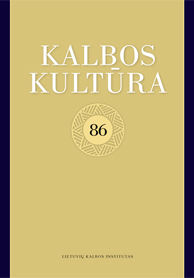Iš kur jõrė ir kas iš jõrės
Where does jõrė come from and what comes from jõrė?
Author(s): Jonas KlimavičiusSubject(s): Baltic Languages
Published by: Lietuvių Kalbos Institutas
Keywords: barbarisms; names; jorė; Jorūnė; Joris
Summary/Abstract: In 1912 Kazimieras Būga argued that jõrė ‘spring vegetation’ is a Slavism (Aleksander Brückner – as far back as 1877). All etymologists took the same road afterwards. However, many did not know them. Jorė and joruoti are included in the Russian-Lithuanian Dictionary published by Jonas Baronas in 1924, meaning that they are not considered foreign words. The Dictionary of Lithuanian (IV 1957) does not consider jorė and its gender forms as barbarisms. It is a less common word of the Samogitian dialect, mostly disseminated through the dictionaries of Simonas Daukantas and Antanas Juška; however, it is neither known from the old writings nor was it trying to pave its way into the new standard language. In the absence of a timely reaction, a gap nevertheless opened. Most importantly, it was neither corrected in The Corrections of the Dictionary of Lithuanian by Vytautas Vitkauskas nor in the electronic edition of The Dictionary of Lithuanian (2013).In 1968 Antanas Salys opened the way to Jorūnė – probably deriving from Putinas, Lithuanian poet and writer – into the index of Lithuanian proper names; the continuity – with Joris, Jorė, Jorūnas, Jorigis, Jorigė – was established by Bronys Savukynas. The background for such carelessness was a gradual strengthening of an irresponsibly liberal approach towards barbarisms. It will not be hard for the truth of science to triumph eventually – it will only suffice to remember. It will be harder to eliminate the outcomes of the long-established error from life (in the worst case scenario, it can be justified by the Scandinavian origin of Joris). The captivity of errors tends to grow in the language practice. However, only the truth brought to life can make us free. An unexpected example is already in front of us – and it does not come from linguistics: a hybrid Soviet Russicism jarovizacija – ‘the adjustment of the plant to seasonal climate changes’– vernalization is already replaced by a true international word jarovizacija (Russian jarovyje – spring crops) ↗ vernalizacija (Universal Lithuanian Encyclopaedia VIII 2005).
Journal: Bendrinė kalba (iki 2014 metų – Kalbos kultūra)
- Issue Year: 2013
- Issue No: 86
- Page Range: 256-264
- Page Count: 9
- Language: Lithuanian

